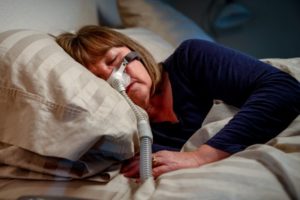
On June 30, 2021, the U.S. Food and Drug Administration (FDA) issued an alert to people who use Philips Respironics ventilators, BiPAP, and CPAP machines and their health care providers that Philips Respironics has recalled certain devices due to potential health risks. (A list of the affected devices manufactured between 2009 and April 26, 2021, is available on the FDA’s website.)
As described by the FDA, the polyester-based polyurethane (PE-PUR) sound abatement foam, which is used to reduce sound and vibration in the affected devices, can:
- Break down (degrade) into particles which may enter the device’s air pathway and be inhaled or swallowed by the user
- Release certain chemicals into the device’s air pathway, which may be inhaled
The FDA reports that these issues can result in serious injury, which can be life-threatening, cause permanent impairment, and require medical intervention to prevent permanent damage. The potential risks of particulate exposure, per the FDA, not only include “irritation to the skin, eye, and respiratory tract, inflammatory response, headache, asthma,” but also “toxic or carcinogenic effects to organs, such as kidneys and liver.” “Carcinogenic” refers to the potential to cause cancer. Likewise, the potential risks of exposure to chemicals released into the device’s air pathway from the PE-PUR foam not only include “headache, dizziness, irritation in the eyes, nose, respiratory tract, and skin, hypersensitivity, nausea/vomiting,” but also “toxic and carcinogenic effects” as well.
The recalled devices are used to provide breathing assistance. Specifically, the FDA describes the recalled machines as follows:
- A bilevel positive airway pressure (also known as BiPAP, BiLevel PAP, or BPAP) machine pumps air under pressure into the airway of the lungs. BiPAP machines have a higher pressure when an individual breathes in and lower pressure when the individual breathes out.
- A continuous positive airway pressure (CPAP) machine keeps an individual’s airway open by providing a continuous stream of air through a mask. CPAP machines are devices prescribed to people with obstructive sleep apnea to keep their airways open during sleep.
- A continuous ventilator device is intended to mechanically control or assist patient breathing by delivering a predetermined percentage of oxygen in the breathing gas.
If you use one of these affected devices, the FDA recommends that you contact your health care provider to decide on a suitable treatment for your condition.
Potentially Injured by a Recalled Device?
If you or a loved one have been injured, or suspect that you may have been injured by one of the recalled devices, in addition to immediately consulting with your healthcare provider for diagnosis and treatment, you may want to also consider preserving your device and consulting with an attorney to discuss the legal aspects of your potential claim.
Attorney Pamela Borgess, the founder of Borgess Law, LLC has decades of experience with numerous national high-profile cases involving defective or recalled medical devices, pharmaceutical drugs and consumer products, and has obtained compensation for thousands of individuals injured by defective or recalled products. We are happy to discuss your legal options. For more information, contact Borgess Law at (567) 455-5955. You can also contact Borgess Law by submitting an online inquiry. Consultations are free and confidential. Further, if the claim is one we are willing to pursue on your behalf, there is no fee or expense owed until and unless a recovery is obtained. We welcome any questions you may have.
*This blog does not contain medical advice and is not intended to substitute for professional medical advice, diagnosis, or treatment. Please consult with your physician for personalized medical advice.